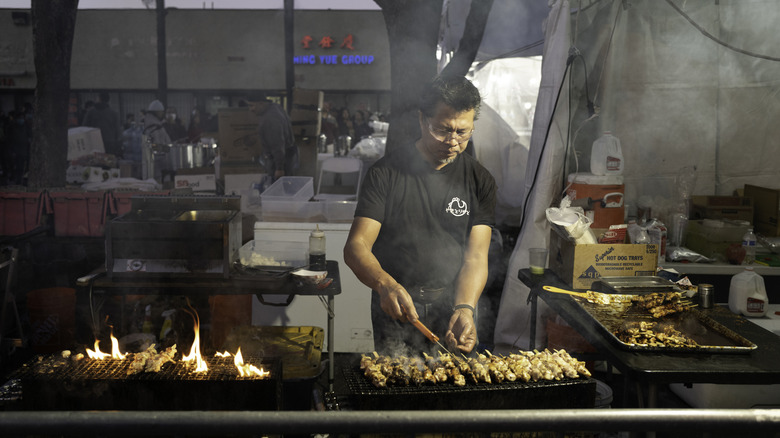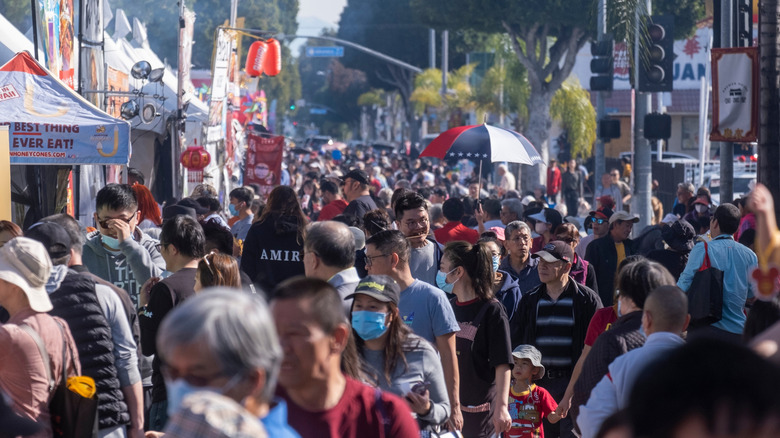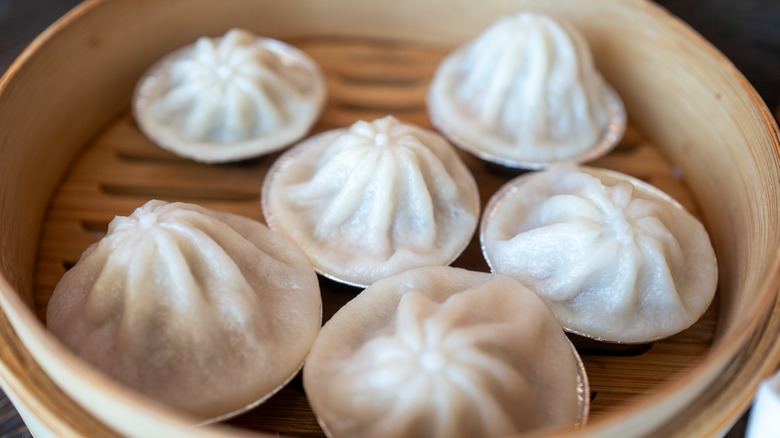The California City Known As The 'Chinese Beverly Hills' Is A Mouthwatering Culinary Hot Spot
Because of its sheer size and population, the Los Angeles Metro area encompasses so many unique oddities and hidden gems, like the famous flea market destination in Pasadena. So, when it comes to traveling, there are many different reasons to plan a visit to the City of Angels. If you're a fan of Chinese culture and cuisine, one of the most compelling attractions is the city of Monterey Park. Although you may think that L.A.'s Chinatown would be the best bet for a Chinese-American experience, Monterey Park (aka the Chinese Beverly Hills) is a much better alternative.
First of all, you don't have to deal with the oppressive L.A. traffic or lack of parking. Second, you can avoid throngs of tourists. Finally, Monterey Park has some of the best Chinese restaurants on the West Coast, thanks to decades of Chinese immigrants calling the city home. While Monterey Park has more to offer than world-class dining, the food is certainly the main attraction. Whether you like noodles, buns, seafood, or tofu, the entire city is basically a giant smorgasbord (as long as you appreciate Chinese cooking). Plus, you can incorporate these restaurants along with other free things to do in L.A. for a fun and vibrant vacation that won't break the bank.
Why Monterey Park is known as the Chinese Beverly Hills
As with most cities and neighborhoods in Southern California, Monterey Park was originally inhabited by Native Americans and Spanish colonists. During the 1700s, the Spanish established the Mission San Gabriel de Archangel, and the area was largely uninhabited until the early 1900s. The city was established in 1916, and much of the initial development occurred during the 1920s.
But that all changed in the 1970s, thanks to a real estate developer named Fred Hsieh. At the time, L.A.'s Chinatown was overcrowded and expensive, so Hsieh billed Monterey Park as the "Chinese Beverly Hills" in a bid to attract Chinese immigrants from both nearby and in China. Within 10 years, the demographics of the city shifted heavily, and by 1983, Monterey Park had its first Chinese-American mayor, Lily Lee Chen.
Currently, the city is about 65 percent Asian, followed by 28 percent Latino and 14 percent White. So, as you can imagine, Chinese and Asian cultures are rampant throughout the city. Restaurants, businesses, and even billboards reflect the heritage of the residents. Although this shift has caused clashes with other residents in the past, Monterey Park is proud to hold such a special place in the Chinese-American community.
Planning a culinary expedition to Monterey Park
Because Monterey Park is so close to Los Angeles, the best way to get there is to fly into LAX and drive northeast to reach the city. However, if you want to avoid landing in one of the worst airports in the world, you can fly into Burbank's Bob Hope Airport, which is north of L.A. Oddly enough, because of traffic, it actually takes less time to get there from Burbank than it does from LAX (according to Google Maps).
But what about the food? Well, there are so many excellent restaurants that it's hard to narrow any list down to a handful of options. Still, let's try. First, if you love dumplings, you'll want to head over to Mama Lu's Dumpling House. If you prefer hot pot, Boiling Point is just down the street. If you want a more prestigious dining experience, you can always get some seafood at the NBC Seafood House (not affiliated with the network). Or, if you prefer something a bit more relaxed, the Beijing Pie House is a unique option with Chinese-style meat and veggie pies.
Chinese food isn't the only type of cuisine you can find in Monterey Park. If you like pastrami sandwiches, the world-famous restaurant The Hat is in the city. Cook's Tortas offers some of the biggest, most mouthwatering Mexican sandwiches in the area. Or, if you're feeling Italian, you can get traditional pasta dishes at Ravello Osteria. Just make sure you have a sizable appetite no matter where you go.


